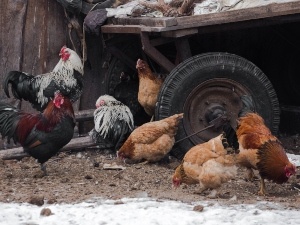
Chickens aren’t known to have issues with balance, these animals are symmetrical which helps them keep their balance.
If your bird starts to fall over to one side you’d be right to be worried. This article explores why this happens.
Table of Contents
Chicken falling over to one side:
If your bird falls over to one side on occasion this shouldn’t be much of a problem, the bird likely tripped over something, but if your bird consistently goes off balance and falls over to one side you’d be right to be worried.
Here are possible reasons why your bird may be doing this:
Marek’s disease:
Marek’s disease is a bird owners’ worst fear, and unfortunately, it is quite common. This disease can show up and affect chickens in a variety of ways, one way that this disease can affect your bird is by making it lose its balance.
Marek’s can cause your bird to lose balance because it causes weakness and paralysis, it can paralyze one or both of your bird’s legs.
Other signs of this disease include difficulty breathing, combs becoming darker, cancerous tumors, weight loss, depression, bright green stools, and, loose and watery stools, these symptoms can develop with classic marek’s.
Ocular marek’s causes deformed pupils, blindness, and iris discoloration. Cutaneous marek’s causes lesions or deformities at the feather follicles.
What to do:
There is no cure for this disease. There is a marek’s vaccine but the vaccine only helps the bird build resistance and reduces the chances of the bird developing symptoms, the vaccine does not keep the disease away.
Botulism
Another reason why your bird’s leg may be becoming lame, causing the bird to fall over to one side, may be that the bird has botulism. This condition affects turkeys, ducks, chickens, and waterfowl.
Birds get this ailment when they ingest a bacterial toxin (produced by the bacteria Clostridium botulinum) found in rotting fruits, rotting vegetables, decaying animal matter as well as maggots that contain the toxin.
One symptom of this disease is paralysis of the legs which causes a bird to fall over, other signs of this condition include weakness, paralysis of the wings then neck, and finally, sudden death
What to do:
You’d need to remove any rotting fruits and vegetables, carcasses, or maggots from your bird’s feeding area.
You’d also need to take the bird to the vet who will examine and diagnose the bird as well as give the bird antibiotics to fight the bacteria. The vet will also give the bird selenium.
Bumblefoot:
If the reason why your bird is falling over to one side is not internal then it will be external, the bird may have bumblefoot. If the bird limps and favors one foot, and starts falling over, then the bird may have bumblefoot.
This condition develops when a chicken’s foot gets cut, the opening gets infected, and forms a black mass called a bumble. The foot will become swollen, uncomfortable, and painful to walk on
What to do:
You’d need to first check your bird’s feet to see whether the bird does in fact have bumblefoot. Look under each of the bird’s feet to see if the bird has a central black mass under any of its feet. If you realize that this is the issue then you can quickly treat it.
Treat the bird by soaking its foot in a bowl filled with warm water and Epsom salts. Do this for 10-15 minutes then gently pick away at the bumble using tweezers, do this slowly and repeat the soaking if needed.
Dress the foot afterward using Neosporin, a gauze pad, and a vetwrap. Allow the wound to heal completely before leaving the wound without the wrap.
Vitamin deficiency:
A vitamin deficiency can cause all kinds of problems in your bird, giving the bird the correct vitamins is key to good bird health.
A lack of vitamin E or riboflavin can cause the bird to fall over to one side. A lack of vitamin B2 can also cause lameness and paralysis causing your bird to fall over to one side
What to do:
If you suspect that your bird has a vitamin deficiency then you’d have to look at what the bird is eating.
Is the bird eating the correct feed for its age, breed, and weight? The correct feed will deliver all the nutrients that the bird needs to live a long and healthy life.
If the bird is suffering from a riboflavin or vitamin E deficiency then adding poultry vitamins or Poly-Vi-Sol without iron to the bird’s diet will help it get well. Give the bird 3 drops of Poly-Vi-Sol daily directly into the bird’s mouth.
FAQ:
What would cause a chicken to suddenly not be able to walk?
If your bird suddenly can’t walk then this may be because the bird is injured, at its back, and this injury is preventing the bird from being able to walk.
If the bird is a female then there may be a shelled egg too high up in the oviduct and this egg may be pinching the nerves radiating out to her legs.
What causes a chicken to fall over dead?
Your chicken falling over to one side as it walks is one thing, but if the animal simply falls over dead then this is something else.
In this case, there will be no signs of injury, just the animal not breathing anymore, this condition is called sudden death syndrome
This condition is most common in fast-growing broiler breeds. Factors that play a role in your bird developing this condition include a diet high in glucose causing rapid weight gain and sudden death, lighting, genetics, and a lack of exercise
If you enjoyed this article then you may also be interested in other chicken related articles. Here are some articles that you may be interested in: Chick Leg Problems, Chicken Sprained Leg, Crippled Chicken, Paralysis In Chickens Caused By Argas

